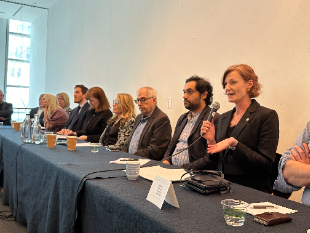Translators and authors join forces as AI brings challenges along with opportunities
Two of the world’s leading professional bodies dealing with the AI explosion, authors and translation professionals, are collaborating on a response to a lack of regulation in the digital sphere, and the implications for copyright law and authorship rights.

The International Federation of Translators (FIT) and the International Authors Forum (IAF) are working to help their members respond to the legal and ethical minefields posed by increased use of AI in their respective fields.
FIT president Alison Rodriguez was invited to the IAF’s Annual General Meeting in New York as an observer and to participate in discussions taking place alongside the meeting.
“Synergies between authors and translators have never been stronger, especially when dealing with unrestricted use of our work to train AI and a lack of recognition of our members’ expertise or their rights,” said FIT President, Alison Rodriguez.
“Like the Hollywood actors and writers had to draw a line in the sand to say ‘humans matter’, we also need urgent action by lawmakers, businesses and the general public to allow us to use this technology fairly, safely, and ethically.”
She added that the problem was compounded by differences between jurisdictions, as translation professionals often live and work across geographical and cultural boundaries.
A series of panels highlighted the close parallels between the challenges and changes faced by both translators and authors in the digital environment.
Ms Rodriguez joined participants Andrew Foglia from the US Copyright Office, Umair Kazi of The Authors Guild, WIRED Magazine’s Steven Levy and Michelle Woods from WIPO on a discussion panel titled ‘The Impact of Artificial Intelligence on Authorship: Navigating Copyright, Ownership and Rights’ chaired by Authors Guild CEO Mary Rasenberger.
In the second panel of the day, moderated by Janet Hicks (VP, Artists’ Rights Society), a discussion of current legal cases in defence of authors’ rights took place between panellists Paulina Holmgren (President, Swedish Association of Professional Photographers), Scott Sholder (Attorney, Associate to Artists’ Rights Society) and Christian Zimmerman (CEO, Design & Artists Copyright Society).
As part of the event, John Degen, Chair of IAF, reiterated the importance of the art of translation as integral to the growth and support of global literature, and the value of a strong working relationship between both associations focusing on shared concerns.
Like FIT, the International Authors Forum collaborates with UNESCO and the World Intellectual Property Organization on cultural and copyright matters, and campaigns at both national and international levels. The IAF represents more than 700,000 authors worldwide and campaigns for their interests, providing national authors’ organisations with an international platform to exchange information, develop policy positions, and provide support in matters concerning authors’ rights.